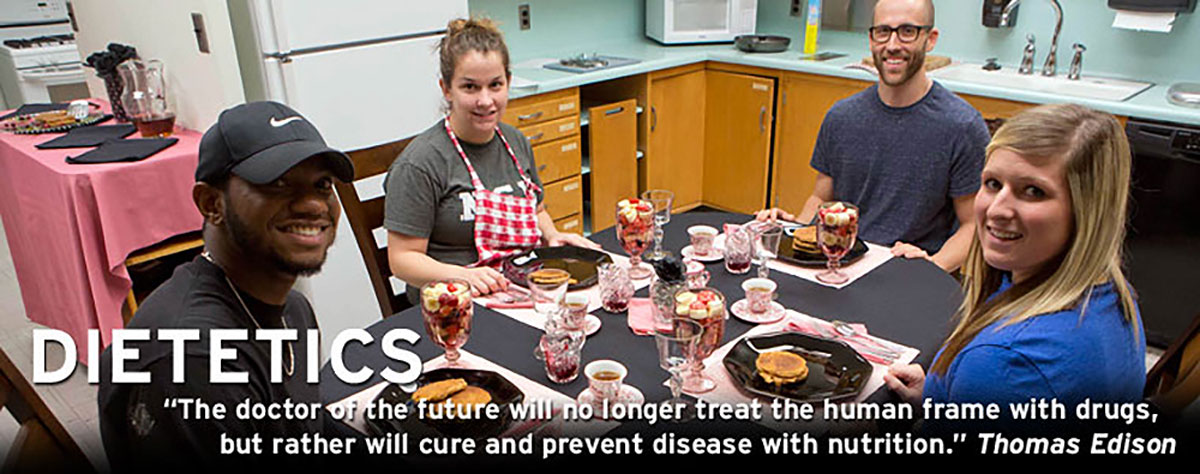Nutritional Sciences Dietetics

NSU Dietetics Degree Program
The Dietetics option under Nutritional Sciences at NSU is a traditional 4 year health professions degree. Students complete their general education and dietetic prerequisite couses first while attending class on one of our three NSU campuses. Once students have met the requirements outlined in the catalog to declare dietetics as their major, they complete the last 2 years of the degree. Several of the Dietetics courses are blended courses, offered on campus and/or virtually. Students will graduate with a B.S. in Nutritional Sciences: Dietetics from an accredited DPD program. In thei senior year, students will begin Step 2 (apply to a Dietetic Internship and graudate program? in becoming a Registered Dietitian Nutritionist.
Professional Licensure Disclosure
Effective January 1, 2024, the Commission on Dietetic Registration (CDR) will require a minimum of a master’s degree to be eligible to take the credentialing exam to become a registered dietitian nutritionist (RDN). In order to be approved for registration examination eligibility with a bachelor’s degree, an individual must meet all eligibility requirements and be submitted into CDR's Registration Eligibility Processing System (REPS) before 12:00 midnight Central Time, December 31, 2023. For more information about this requirement visit CDR's website: https://www.cdrnet.org/graduatedegree. In addition, CDR requires that individuals complete coursework and supervised practice in program(s) accredited by the Accreditation Council for Education in Nutrition and Dietetics (ACEND). Graduates who successfully complete the ACEND-accredited Didactic Program in Dietetics (DPD) at Northeastern State University are eligible to apply to an ACEND-accredited supervised practice program/apply to take the CDR credentialing exam to become an RDN.
In most states, graduates also must obtain licensure or certification to practice.
Get more information about educational pathways to become a RDN.
The Field of Dietetics
If a career is desired that is exciting, challenging, and allows one to succeed, excel, and feel good about what is done, then consider the field of dietetics.
Dietetics is the high-tech science of applying food and nutrition principles to personal and community health. It's a vital, growing field open to creativity and opportunity. The possibilities are endless.
The field of dietetics has something to offer all health care consumers. The Registered Dietitian is the only nationally recognized credential in foods, nutrition, and dietetics, and is recognized as the nutrition expert in health care, nutritional counseling, food production, sales, and the media. Most employment in the health care industry requires the R.D. credential. Jobs with the most potential for advancement are closed to nutritionists, who are not registered dietitians.
To become a registered dietitian, one must complete a didactic program in dietetics, apply for and complete an ACEND-accredited supervised practice program, and pass the nationally administered registration exam.
Program Requirements
- Nutritional Science - Dietetics Course Sequence
- Nutritional Science - Dietetics Accelerated Degree Program Course Sequence
- Course Catalog
Current and prospective students should also review:
Program Goals and Objectives
Goal 1:
The program will produce graduates who are competent for entry into supervised practice and other postgraduate professional programs by utilizing their dietetics education and knowledge attained through high-quality educational offerings.
Objectives:
*At least 80% of students complete program requirements within 3 years (150% of the program length).
*At least 50% percent of the program graduates apply for admission to a supervised practice program prior to or within 12 months of graduation.
*Of program graduates who apply to a supervised practice program, at least 50% percent are admitted within 12 months of graduation.
For students not applying to ACEND accredited dietetic internships, >50% of graduates will secure appointment to a graduate program or employment, which utilizes their dietetic education within 12 months of graduating the DPD Program.
*The program’s one-year pass rate (graduates who pass the registration exam within one year of first attempt) on the CDR credentialing exam for dietitian nutritionists is at least 80%.
Goal 2:
Program graduates will be prepared to think analytically, apply learned knowledge and skills, and practice effective communication with the public and other health professionals.
Objectives:
80% of supervised practice directors agree that our graduates are able to think analytically, apply learned knowledge and skills, and practice effective communication with the public and other health professionals.
80% of supervised practice directors agree that our graduates are able to exhibit cultural competence/sensitivity in interactions with clients, colleagues, and staff.
*Accreditation Council for Education in Nutrition and Dietetics required objectives.
Dietetics Student Achievement Data
The mission of the NSU Didactic Program in Dietetics (DPD) is to provide a comprehensive and relevant bachelor's degree that prepares graduates for a supervised practice experience. Upon supervised practice completion, the graduate can sit for the Registered Dietitian/Nutritionist (RDN) exam, and upon passing, utilize the RDN credential. Graduates of the program will think analytically, apply learned knowledge and skills, and communicate effectively with the public and other health professionals. The DPD focuses upon service to the northeastern Oklahoma community through education and outreach, accommodating a multiculturally diverse community.
The Didactic Program in Dietetics at NSU is accredited by the Accreditation Council for Education in Nutrition and Dietetics (ACEND) of the Academy of Nutrition and Dietetics, 120 South Riverside Plaza, Suite 2190, Chicago, Il 60606-6995; (800) 877-1600 or (312) 899-0040. This program allows for mastery of the Knowledge Requirements of Registered Dietitian/Nutritionists (KRDNs) and learning outcome for Didactic Programs as set forth by the Academy of Nutrition and Dietetics.
The tables below provide recent data on NSU candidate performance on the national Registered Dietitian Exam administered by the Commission on Dietetic Registration.
| Year | Number Passing | Percent Passing |
| 2022 | 8/11 | 73% |
| 2021 | 3/6 | 50% |
| 2020 | 5/7 | 71% |
| 2019 | 3/7 | 43% |
| 2018 | 3/6 | 50% |
| 2017 | 7/8 | 88% |
| 2016 | 3/3 | 100% |
Three-year averages
| Years | Percent Passing |
| 2020-2022 | 67% |
| 2019-2021 | 55% |
| 2018-2020 | 55% |
| 2017-2019 | 60% |
| 2016-2018 | 79% |
Career Opportunities
Dietitians enjoy diverse career opportunities, including:
- Healthcare (clinical and community dietetics)
- Management (healthcare and commercial)
- Community Nutritionist
- Sales or marketing of food or equipment
- Dietetics Educator/Researcher
- Government
- Fitness
- Private practice
Dietician Salaries
According to the Bureau of Labor Statistics, the national median annual wage for dietitians and nutritionists was $69,350 or $33.34 in 2023. Meanwhile, the average wage in the state of Oklahoma was $ $60,950 or $29.13 per hour in 2023.
A profession that is more than a job.
Dietetics is a career with growing potential. The U.S. Department of Labor projects that employment of dietitians is expected to increase 15% (much faster than average) from 2016-2026. Job growth will result from increasing emphasis on disease prevention through improved dietary habits. Public interest in nutrition and increased emphasis on health education and prudent lifestyles will also spur demand.
The number of jobs for dietitians is expected to increase to meet the growing demand by Americans for healthy foods and fat-free foods. The best opportunities for qualified dietitians are in hospitals, clinics, physician groups, nursing homes, hotels, restaurants, health clubs, food manufacturing companies, and social service programs.
Resources

- Academy of Nutrition and Dietetics
- Commission on Dietetic Registration
- Oklahoma Academy of Nutrition and Dietetics
- Oklahoma Board of Medical Licensure and Supervision
- DICAS: Dietetic Internship Centralized Application Services
- DI Matching: D&D Digital
- NSU Library Resources
- USDA: United States Department of Agriculture
- Choose My Plate
- Medicine Plus: Food and Nutrition
Student Nutrition Association
 The purposes of the Student Nutrition Association are:
The purposes of the Student Nutrition Association are:
- To provide a healthy well-rounded lifestyle through the study and practice of food service and nutrition
- To provide community service
- To encourage attendance and participation at professional meetings related to foods, nutrition, and dietetics
The Student Nutrition Association actively works with the Oklahoma Academy of Nutrition and Dietetics, the Academy of Nutrition and Dietetics and the Cherokee Nation as part of their community service commitment.
Visit the SNA page on HawkLife for more information.
